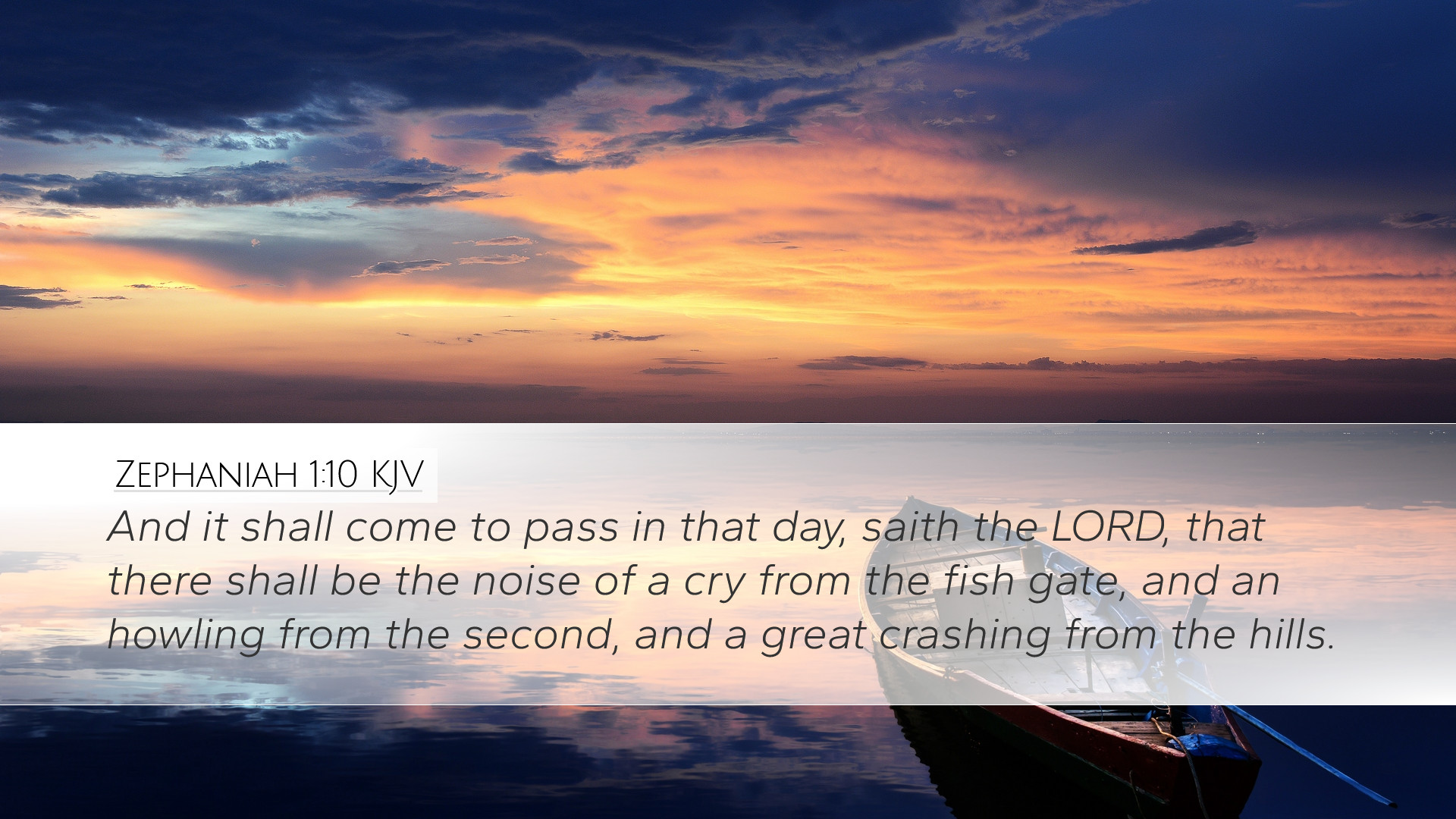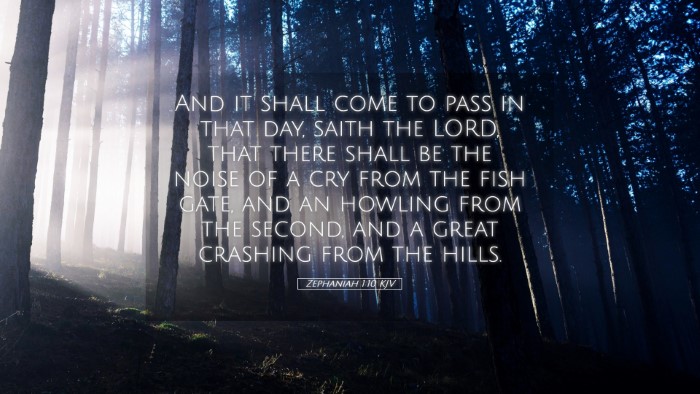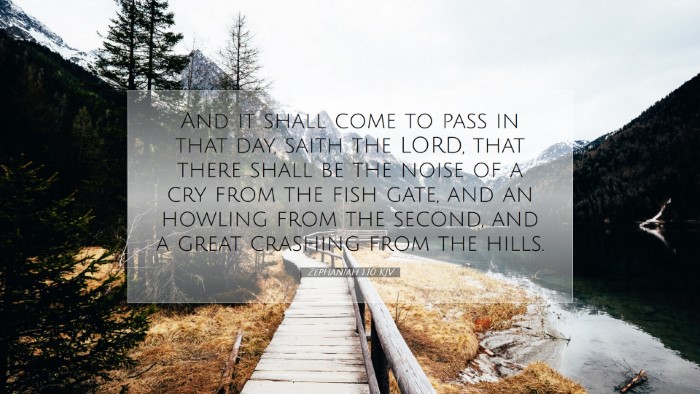Old Testament
Genesis Exodus Leviticus Numbers Deuteronomy Joshua Judges Ruth 1 Samuel 2 Samuel 1 Kings 2 Kings 1 Chronicles 2 Chronicles Ezra Nehemiah Esther Job Psalms Proverbs Ecclesiastes Song of Solomon Isaiah Jeremiah Lamentations Ezekiel Daniel Hosea Joel Amos Obadiah Jonah Micah Nahum Habakkuk Zephaniah Haggai Zechariah MalachiZephaniah 1:10
Zephaniah 1:10 KJV
And it shall come to pass in that day, saith the LORD, that there shall be the noise of a cry from the fish gate, and an howling from the second, and a great crashing from the hills.
Zephaniah 1:10 Bible Commentary
Bible Commentary on Zephaniah 1:10
Verse Reference: Zephaniah 1:10 - "And it shall come to pass in that day, saith the Lord, that there shall be the noise of a cry from the fish gate, and an howling from the second, and a great crashing from the hills."
Introduction
The book of Zephaniah is a prophetic message addressing the impending judgment of God against Judah and Jerusalem. Scholars traditionally attribute the authorship of the book to the prophet Zephaniah, who prophesied in the reign of King Josiah. This verse, Zephaniah 1:10, falls within a section that vividly describes the despair and destruction that will accompany God's judgment.
Contextual Analysis
In the context of the book, Zephaniah's message comes during a time of significant spiritual decline and idolatry among the people of Judah. The nation was engaging in practices contrary to the covenant with Yahweh, leading to prophetic warnings of purification through calamity.
Commentary Insights
- Matthew Henry: In his commentary, Henry emphasizes the sobering reality of impending judgment when he describes the "noise of a cry" as indicative of panic and devastation. The reference to the "fish gate" suggests a specific location in Jerusalem associated with trade, symbolizing a place where economic despair will manifest. The upheaval sounds not only from commercial hubs but also from residential areas, illustrating the pervasive nature of God's judgment.
- Albert Barnes: Barnes expands on the geographical implications of the verse, particularly the "second" gate, which may suggest the importance of duality in guilt—spiritual and civil. His interpretation indicates that the howling from this location denotes deep sorrow and loss, indicating a societal collapse. Barnes articulates how this prophetic utterance connects the physical locations within Jerusalem to the spiritual state of the nation, thereby calling attention to its holistic need for repentance.
- Adam Clarke: Clarke remarks on the phrase "great crashing from the hills," elucidating its representation of significant socio-political turmoil. He suggests that hills could symbolize places of leadership and authority, thus, their crashing suggests a fall from grace of the leaders who have led the people astray. Clarke contends that this reflects a divine orchestration in which the very foundations of society are shaken due to disobedience towards God.
Thematic Considerations
- The Nature of Judgment: This verse encapsulates the essence of divine judgment: it is loud, unmistakable, and universal within its domain. Each sound mentioned reflects different aspects of lamentation and despair that will resonate through the community.
- Urgency of Repentance: The chaotic cries and howls serve as a clarion call for repentance. God's judgment is a response to the pervasive sin leading to social and moral disintegration. The message for modern readers is that neglecting spiritual accountability can bring adverse consequences.
- God’s Sovereignty: The prophetic utterance underscores that God is sovereign over nations and their fate. Even when faced with despair, it is imperative to acknowledge His hand at work in history and personal lives. The impending calamity serves as a reminder that accountability to divine law remains central.
Applications for Today’s Church
As we reflect on Zephaniah 1:10, pastors, students, and scholars ought to draw lessons pertaining to societal sin, the nature of divine discipline, and the reality of judgment. There is an urgent call for introspection regarding the corporate practices of the church and its community. Identifying areas that deviate from the teachings of Christ is essential for a modern-day application of Zephaniah's warnings.
- Spiritual Self-Examination: It is vital for congregations to engage in regular self-examination of values, beliefs, and practices, ensuring they align with biblical teachings.
- Community Engagement: The church must actively participate in its local communities, addressing injustices and being a voice for those who are marginalized, thus embodying the compassion of Christ.
- Preaching on Judgment: Meaningful preaching must include the realities of God’s judgment and the inherent call to repentance, much like Zephaniah's prophetic declarations.
Conclusion
Zephaniah 1:10 is a poignant reminder of the consequences of neglecting divine instruction and the reverberating impact of sin on broader society. As believers, understanding this verse allows for a deeper appreciation of God’s character and His expectations for a righteous living. By heeding the lessons found within, churches can foster genuine repentance and embody God’s redemptive purpose in the world.


